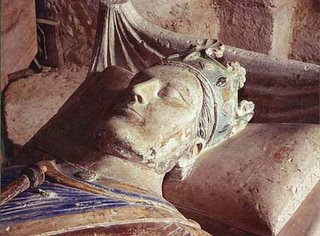Henry FitzEmpress

The son of Matilda, the conquering "Lady of the English" and Geoffrey Plantagenet, the Count of Anjou, Henry "FitzEmpress" (born on this day in 1133 in LeMans, France) grew up with his mother's mercurial nature and with seemingly inexhaustible energy, which powered both his delight in hunting and the outdoors as well as an appreciation for literature. While his mother fought Stephen of Blois for the English throne, his father acquired Normandy and installed Henry as the duke of Normandy in 1150. Henry's French holdings increased with the death of his father the following year (leaving him with Anjou and Maine) and with his seduction by and marriage in 1152 to Eleanor of Aquitaine, a woman 11 years his senior who had divorced Louis VII of France.
By the time he was crowned king of England (after Stephen's death in 1154, in accordance with Stephen's ultimate submission to the claims of Matilda's line), Henry II of England held more French territory than the king of France, and more of Earth's territory than any previous English king. As king, Henry focused on reestablishing royal prerogatives which had fallen to waste under Stephen's weak reign. Not only did this involve successful raids against the Scots and the Welsh (and a papal bull issued by English Pope Adrian IV in 1155 giving Henry hegemony over Scotland, Wales and Ireland), but it meant a full-scale political battle against the Church over the independence of ecclesiastical courts and his ability to tax the Church's wealth.
He secured the election of his friend and close advisor, Thomas a Becket, as archbishop of Canterbury in 1162, by which he had hoped to get his way; unexpectedly, however, Becket stubbornly stuck to Church principles, and by 1164, the two were no longer speaking to each other as Becket was forced into exile in France. Through the intercession of Pope Alexander III, Becket returned to England in 1170 under an uneasy detente with his old friend. Henry's intemperate rhetorical question -- "Will no one rid me of this turbulent priest?" -- overheard by some literal-minded knights sent them to Canterbury on December 29, 1170, where they murdered Becket in the Cathedral.
Becket's murder sent shockwaves around Europe, and though Becket did not die under Henry's direct orders, Henry felt obliged to go to Becket's tomb barefoot and prostrate himself before it, praying for forgiveness and subjecting himself to public humiliation.
Much of the remaining years of Henry's reign were taken up with disagreements among himself and his sons Henry, Richard, Geoffrey and John. He chose young Henry as his successor in 1170, but young Henry desired more than the title of heir apparent; and the more that young Henry clamored for power, the more that Richard and Geoffrey began to distance themselves from Henry II. Young Henry died of a fever in 1183 and Geoffrey died in a tournament accident in 1186, leaving Henry II in support of his favorite, John, in opposition to his disaffected wife Eleanor and her favorite, Richard. However, the news that John had joined Richard's army against Henry II broke his spirit; and after reaching an agreement with King Philip II of France, who had used the wrath of Henry's sons to gain their complicity in taking back certain French territories, Henry died of a massive hemorrhage at the age of 56.
Eleanor's influence won the day as Richard was installed as Henry's successor.
Labels: Kings and Queens





0 Comments:
Post a Comment
Subscribe to Post Comments [Atom]
<< Home